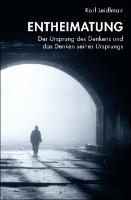Entheimatung
Der Ursprung des Denkens und das Denken seines Ursprungs
Abstract
Human thinking is interpreted as strongly entrenched in a dialectical process between a primordial familiarity with things and breaks in this familiarity. This can be seen both retrospectively in Plato's ambivalent examination of literacy and prospectively in Derrida's différance. The consequences of a dissolution of that process are pointed out in the example of posthumanism. Ausgehend von ausgewählten Themen der Cognitive Science wird ein Brückenschlag erprobt zu einer Sichtweise des menschlichen Denkens, wie sie sich aus Heideggers Interpretation der menschlichen Existenz als In-der-Welt-sein herauslesen lässt. Alles, was ist, erschließt sich dem Menschen vor dem Hintergrund einer Vertrautheit mit den Dingen. Diese Vertrautheit bedarf eines Weckrufs, den Heidegger an einem Prozess der Entheimatung diagnostiziert. Verortet man das menschliche Denken in dem unauflösbaren Spannungsfeld von Vertrautheit und Unvertrautheit, so wäre der Mensch nicht dazu in der Lage, einen Zustand zu beschreiben, der einem solchen Spannungsfeld noch vorausgeht. Dies lässt sich zum einen retrospektiv an Platons zwiespältiger Auseinandersetzung mit der Schrift und zum anderen prospektiv an Derridas différance aufzeigen. Auf die Folgen einer Auflösung jenes Spannungsfeldes, abzulesen an der Verdrängung des Todes, wird am Beispiel des Posthumanismus hingewiesen.
Keywords
Cognitive Science; Derrida; Heidegger; Media Theory; Medientheorie; Phänomenologie; Phenomenology; Philosophy of Technology; Plato; Platon; TechnikphilosophieDOI
10.30965/9783846768419ISBN
9783846768419, 9783770568413, 9783846768419Publisher
BrillPublisher website
https://brill.com/Publication date and place
2024Imprint
FinkClassification
Western philosophy from c 1800


 Download
Download Web Shop
Web Shop